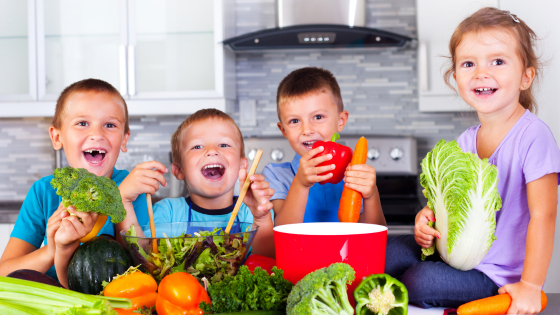School canteen: does it improve our children's eating habits?
Learning to eat well from an early age is of fundamental importance to prevent diseases such as diabetes and obesity . But children must be won over, meal after meal, and the choice of foods as well as the proposal of a tasty menu - at home or at school - are a decisive step.
This is why the school canteen plays a decisive role by offering itself as a model of nutritional education for children and families . Find out more on this topic with us at Mancini junior.
School canteen: an educational role
The school meal is one more opportunity for children to approach a healthy and balanced diet. The objective is , in fact, precisely to transmit to families an educational model that can also be replicated at home but this has not always been the case.
Compared to the past, in fact the role of the school canteen has radically changed. Today there is greater attention to the nutritional aspect of foods, cooking and the needs of the individual child which are carefully studied.
But how do you get to structure a complete menu? What are the figures that come into play? Find out below.
School canteen: how foods are chosen
Composing a complete and balanced menu in schools is not exactly child's play . There are, in fact, guidelines to follow and rework. The task, in agreement with the municipal administrations, falls to professionals such as dieticians and nutritionists who draw up a menu based on the seasonality and quality of the products.

We usually stick to a calendar that lasts 4 or 5 weeks and is then replaced based on the season: spring/summer and autumn/winter . The menu also contains suggestions regarding quantities, ideal portions, calories and/or any other indications.
The choice of food must satisfy certain parameters which concern first of all quality, then seasonality and geographical location . It is obvious that we tend to prefer a local product rather than an imported one. Furthermore, the selected foods are a source of energy, low in sugar and rich in water.
This is to convey correct information from an early age and prevent the onset of any pathologies. But let's see an example of a menu in detail.
School canteen: guidelines and typical menus
The school canteen menus must , as already mentioned, vary with the changing seasons . This happens for a twofold reason. First of all, to avoid getting bored with a monotonous diet but, at the same time, also to educate and encourage you to taste and learn about new flavours.
The culinary proposals , therefore, must not only be balanced in terms of nutritious principles but also appreciable from an aesthetic point of view and be proposed to encourage tasting . Children are often reluctant to try new flavors but in company they are won over by new proposals.
The menus, therefore, also take this into account and enhance recipes and combinations to avoid any fasting and food waste. When developing a menu for the school canteen, the guidelines are clear :
- Introduction of more fruit and vegetables in schools
- Variation of side dishes with alternating fresh or frozen vegetables
- Offer legumes
- Encourage fish consumption
- Limit the use of salt and encourage the consumption of aromatic herbs instead
- Use raw oil
- Bread
- Preferably partially skimmed milk for a snack or snack
- Better whole-fat and fruit yoghurt.
School canteen as a nutritional model
From what we have read so far, it is clear that the role of the school canteen is to provide a model of nutritional orientation for both the child and the family. This happens thanks to:
- different types of food proposals ;
- involvement of families (for good school-family interaction);
- development of educational material to undertake on the right foot and through correct communication a path that has also been followed by the family. Drawings and figures to support an idea of food education.
The key to the success of the school canteen, therefore, depends on various factors that place the child and the quality of the products at the centre.
What is evident is that there is an ever-increasing focus on healthy and correct eating which necessarily also involves schools and their canteens. Nutrition education is, therefore, necessary for a good quality of life and to also address the issue of food waste.
Have you ever talked about it with your children? Have you noticed whether the children's habits have improved since the beginning of school?







